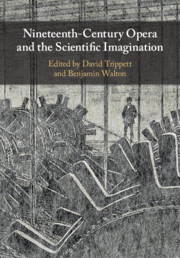Book contents
- Nineteenth-Century Opera and the Scientific Imagination
- Nineteenth-Century Opera and the Scientific Imagination
- Copyright page
- Contents
- Figures
- Tables
- Music Examples
- Contributors
- Acknowledgements
- Introduction
- Part I Voices
- Part II Ears
- Part III Technologies
- Part IV Bodies
- 11 Excelsior as Mass Ornament
- 12 Automata, Physiology and Opera in the Nineteenth Century
- 13 Wagnerian Manipulation
- 14 Unsound Seeds
- Bibliography
- Index
13 - Wagnerian Manipulation
Bayreuth and Nineteenth-Century Sciences of the Mind
from Part IV - Bodies
Published online by Cambridge University Press: 07 August 2019
- Nineteenth-Century Opera and the Scientific Imagination
- Nineteenth-Century Opera and the Scientific Imagination
- Copyright page
- Contents
- Figures
- Tables
- Music Examples
- Contributors
- Acknowledgements
- Introduction
- Part I Voices
- Part II Ears
- Part III Technologies
- Part IV Bodies
- 11 Excelsior as Mass Ornament
- 12 Automata, Physiology and Opera in the Nineteenth Century
- 13 Wagnerian Manipulation
- 14 Unsound Seeds
- Bibliography
- Index
Summary
In one of the most striking passages in his 1892 jeremiad Degeneration, the physician and critic Max Nordau suggested that Richard Wagner’s theory of the Gesamtkunstwerk meant that his works could ‘degrade man to the undifferentiated sense perceptions of the pholas or oyster’.By reducing human perception to one sense, he argued, the audio-visual spectacle at Bayreuth would amount to an attempt literally to reverse evolution in order to suit the brains of a degenerate audience overwhelmed by the stimulations of the modern world. Far from being an eccentric aside, Nordau’s remarks drew on an extensive scientific and medical critique of the multimedia character of the Bayreuth experience focused on its sensory neurophysiological dangers. Many contemporaries made similar arguments, worrying that the all-round sensory experience at Bayreuth was an uninvited attempt to stimulate the nerves, subvert rational thought and leave viewers in a pathological trance state.
- Type
- Chapter
- Information
- Nineteenth-Century Opera and the Scientific Imagination , pp. 287 - 302Publisher: Cambridge University PressPrint publication year: 2019



